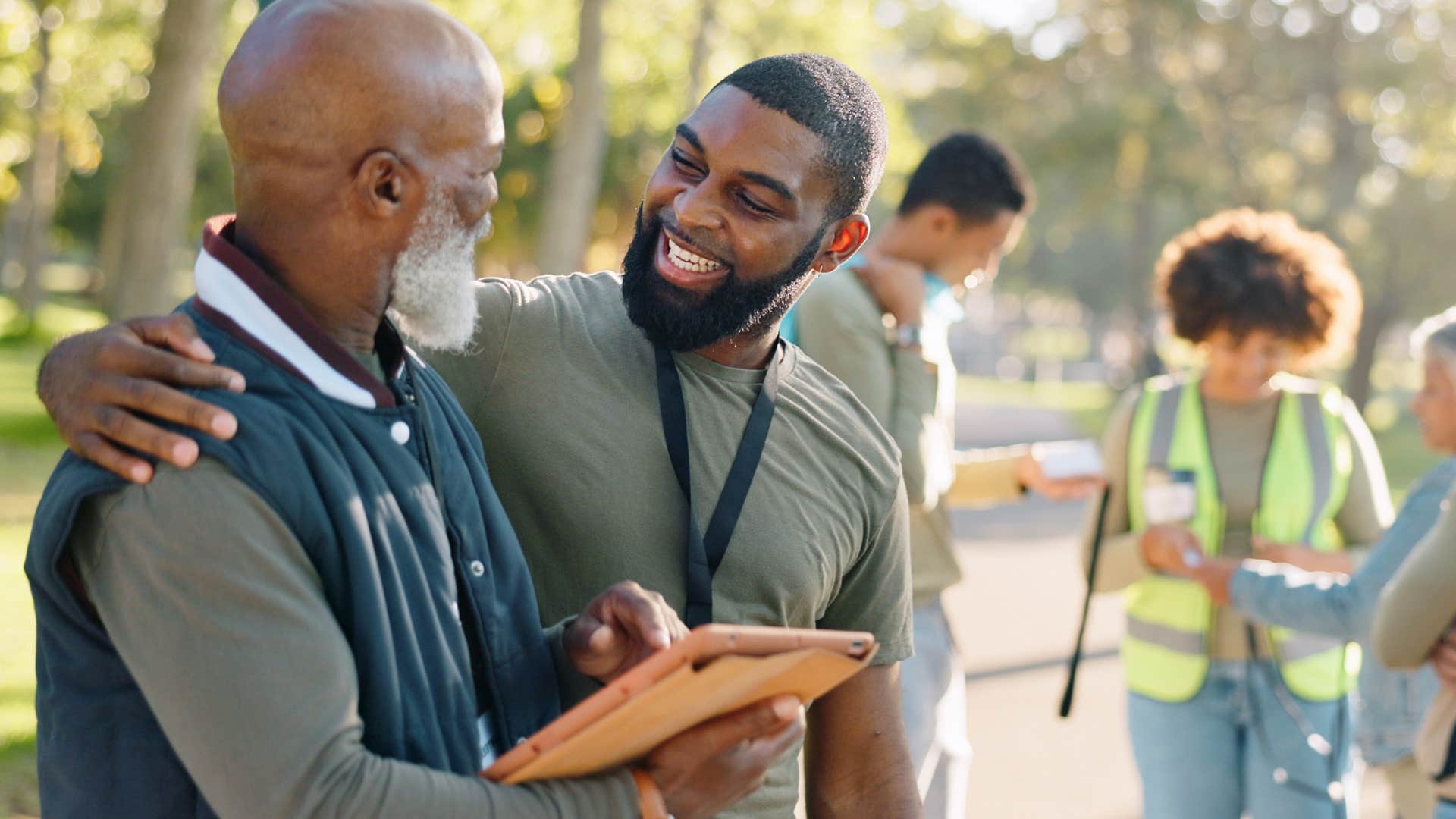People Who Get Embarrassed Easily Always Try To Hide It With These 11 Behaviors
They're constantly overcompensating for their insecurities.
 Asier Romero | Shutterstock
Asier Romero | Shutterstock Many people who live their lives in accordance with social norms or struggle with self-esteem and digesting other people's opinions too deeply are also often embarrassed in their everyday routines, according to a study from the Journal of Personality. Whether it's in their personal relationships or at work, they're always trying to compensate for their feelings of introvertedness, embarrassment, or anxiety, even if it only further isolates them from true authenticity and connection.
Of course, it's not just a personality trait or trauma response, it's also a symptom of brain processing and rituals. People who get embarrassed easily often experience more activity in the parts of their brain associated with emotional processing, prompting them to live in a chronically hypervigilant state, worrying about what other people think of them. To cope, whether it's with avoidance or self-deprecatory humor, people who get embarrassed easily always try to hide it with these behaviors.
People who get embarrassed easily always try to hide it with these 11 behaviors
1. Changing the subject
 fizkes | Shutterstock
fizkes | Shutterstock
According to a study from the Journal of Global Marketing, perceived "failures" and embarrassments often urge people to shift blame and place responsibility on other people to cope with their own feelings of discomfort. By placing the blame on someone else and shifting the subject of their own mistakes, they feel a sense of control over how they're perceived and judged by others.
Even if it comes at the expense of trust in a workplace or satisfaction in a personal relationship, people who get embarrassed easily always try to hide it with these blame-shifting behaviors.
2. Making fun of themselves
 PeopleImages | Shutterstock
PeopleImages | Shutterstock
While laughing at yourself or using self-deprecatory humor can relieve some of the embarrassment hidden in certain situations, like misspeaking during a presentation, overusing it can often make people seem more insecure, rather than confident.
People who get embarrassed easily may feel comforted by making a joke at their own expense, but when it becomes a habit, it can usher them into a space of chronic insecurity and shame.
So, be careful about how you respond to embarrassment and mistakes. The right timing and placement of jokes can be occasionally helpful, but at some point or another, you simply have to take accountability for mistakes, address them, and move on.
3. Over-apologizing
 DimaBerlin | Shutterstock
DimaBerlin | Shutterstock
Rather than apologizing to mend mistakes and supporting other people, clinical psychologist Greg Chasson argues that people who get embarrassed easily may use it as a way to seek validation and reassurance from others. This "anxious over-apologizing" is rooted in insecurity and anxiety, used to comfort an embarrassed person rather than to truly and genuinely apologize.
While it might seem innocent to others, over-apologizing and saying "I'm sorry" after every single embarrassing moment can often burden people with emotional frustration. They feel pressured to now support you or comfort your anxiety, often at the expense of a truly balanced relationship.
4. Over-explaining themselves
 GaudiLab | Shutterstock
GaudiLab | Shutterstock
Even if over-apologizing or over-explaining choices in everyday life feels like an innocent coping mechanism, they're rooted in a chronic sense of insecurity, where a person feels burdensome to others when they don't overcompensate. It's a mechanism to make other people feel comfortable, even if it means overstepping their own boundaries and putting their own self-perception at risk.
Whether it's over-explaining their thought process behind a mistake or trying to justify a bad decision, they're always trying to change people's minds, rather than owning up to their own embarrassment and moving forward.
5. Fidgeting with their hair and clothes
 Gorgev | Shutterstock
Gorgev | Shutterstock
In a psychological sense, fidgeting is often related to anxiety or a feeling of internal turmoil. That's why people who get embarrassed easily or struggle with anxiety regularly in their daily lives often resort to fidgeting in their chairs or playing with their hair and clothes for a sense of comfort.
Even if they don't have the words to express their anxious thoughts, fidgeting is a bodily manifestation of their internal feelings. To cope with the inner stress, they use outward movement to give their brains something to focus on, even if it's clear to other people that they're having a dilemma. In many cases, this is entirely subconscious — they're moving around and fidgeting, without even realizing they're doing it.
6. Being overconfident
 PeopleImages | Shutterstock
PeopleImages | Shutterstock
By bragging about their abilities and being overconfident in their skills, many deeply insecure people find a fleeting sense of comfort, but it's often at the expense of their social perceptions. Of course, being confident encourages people to perceive you in a more positive light, but when overconfidence is always followed up with a lack of ambition or incompetence, it's more harmful than it seems.
In fact, many people who are regularly overconfident are actually less skilled and accurate than their humble counterparts, according to a study from the Journal of Personality and Social Psychology. So, even if they think they're helping themselves and mediating the embarrassing thoughts they're having, this overconfidence does more harm than good.
7. Saying 'I did that on purpose'
 insta_photos | Shutterstock
insta_photos | Shutterstock
By shielding their embarrassment and mistakes with a phrase like "I did that on purpose," anxious people may feel a fleeting sense of confidence or internal security, but it often sabotages their trust with others. True connection and authenticity come from honesty and security, not justifications, blame-shifting, and excuses.
People who get embarrassed easily may often isolate themselves from true connection because they're incapable of being wrong. They perceive their own mistakes as "failures" when, in reality, they're a chance to grow and connect with others when they're responded to with grace and confidence.
8. Withdrawing from conversations or interactions
 silverkblackstock | Shutterstock
silverkblackstock | Shutterstock
While some people rely on a "social approach" to grapple with their internal shame, using over-explaining and justifications to cope with their own embarrassment, others are prone to avoidance in the face of these complex feelings. Rather than leaning on misguided coping mechanisms to draw other people in and escape from isolation, they withdraw from social interactions and conversations where they've felt embarrassed.
Of course, this kind of social isolation can only amplify their feelings of anxiety and insecurity, separating them from connections and conversations that prevent loneliness and depression.
9. Pretending to be unfazed
 fizkes | Shutterstock
fizkes | Shutterstock
Rather than being open and vulnerable about their insecurities with trusted friends, many people who get embarrassed easily try to hide it by pretending to be "chill" or unfazed. While it might give them a fleeting sense of comfort against embarrassment, they're only teaching themselves to dismiss and invalidate their own feelings.
When you suppress complex emotions and discomfort, your embarrassment doesn't go away — it only becomes a deep-rooted part of your identity. At some point or another, those feelings will resurface, often in unexpected ways.
10. Becoming over-interested in someone else
 PeopleImages | Shutterstock
PeopleImages | Shutterstock
People who get embarrassed easily always try to hide it by switching the context of a conversation and ushering someone else into the spotlight. Sometimes, this can be a positive switch, like becoming overly interested in another person's story, but other times, it can be more hurtful, like bringing someone else down with a hurtful phrase or attacking them for triggering personal insecurities.
Regardless of how it manifests itself, this coping mechanism for embarrassment often puts up an emotional wall between an embarrassed person and their social circles. They find it harder and harder to take accountability, resolve their own discomfort, and be open about their complex emotions as time goes on.
11. Giving someone else a compliment
 fizkes | Shutterstock
fizkes | Shutterstock
According to a study from Paper in Linguistics, compliments are often a "social strategy" used in a variety of ways to connect with others, reinforce social bonds, or show solidarity in a group.
However, the study also found that they can be used as a tactic to protect a person's self-image. For example, if someone is embarrassed, they may flip the script by offering compliments to everyone around them, trying to compensate for their own insecurities with positive praise for others.
Zayda Slabbekoorn is a senior editorial strategist with a bachelor's degree in social relations & policy and gender studies who focuses on psychology, relationships, self-help, and human interest stories.

